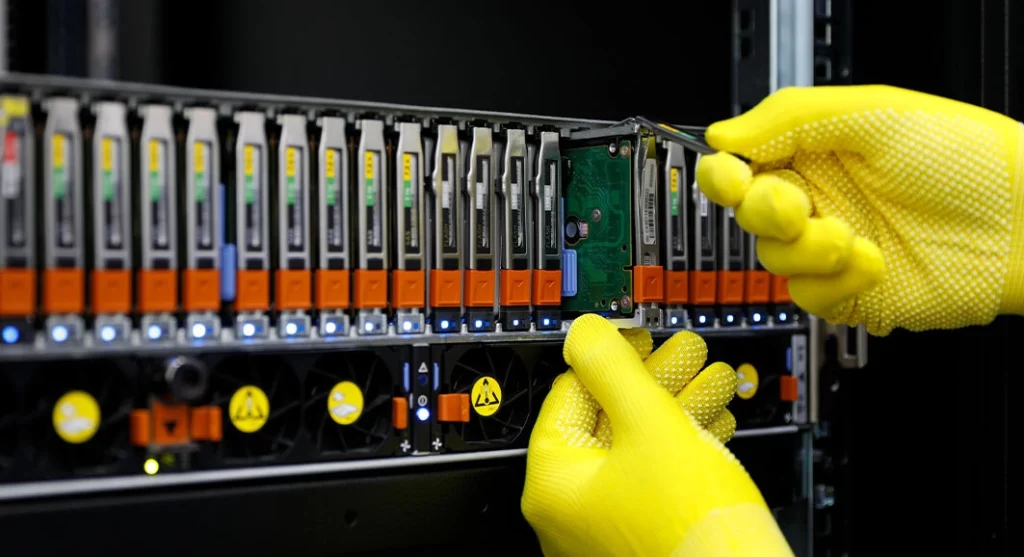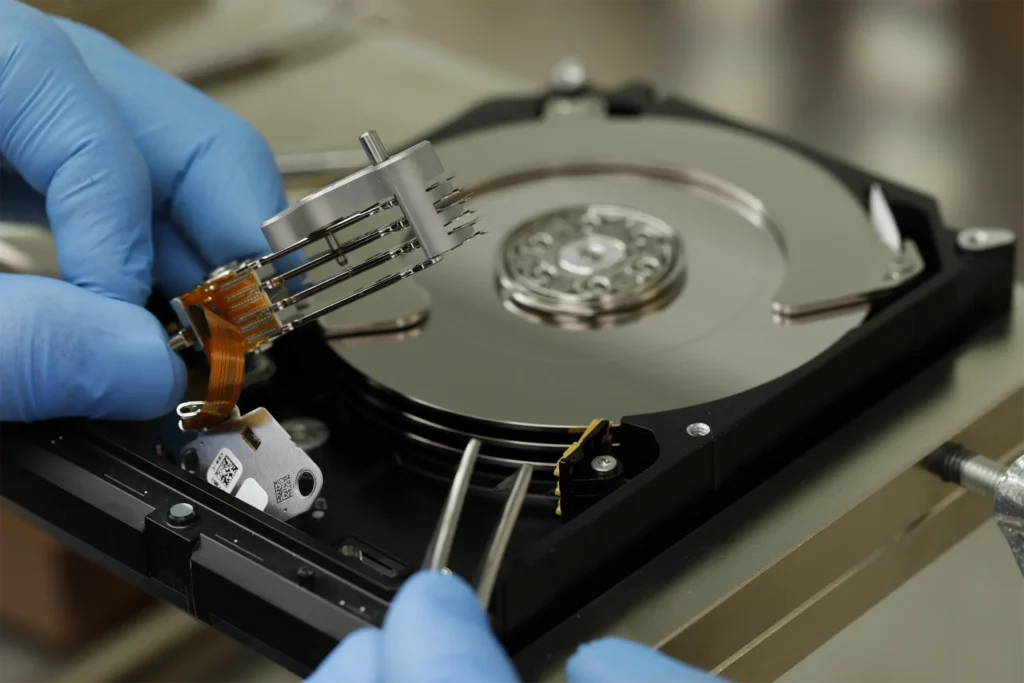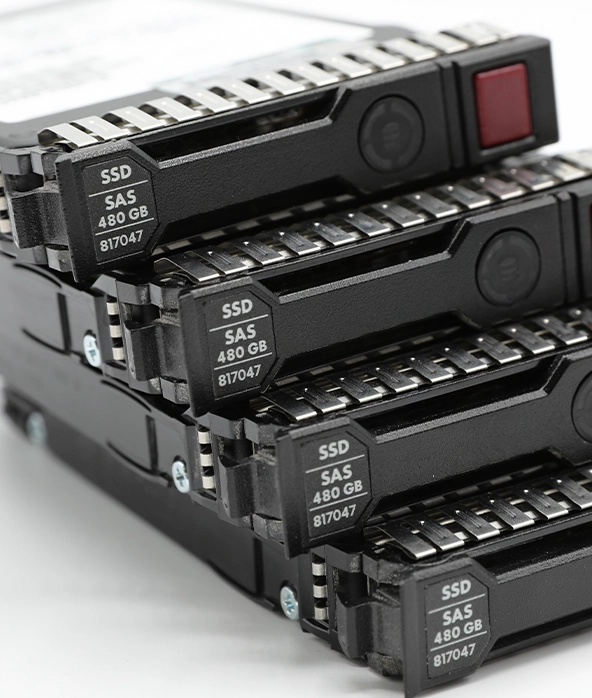RAID Data Recovery Services
Lost access to your RAID array? We recover data from failed, degraded, or rebuilt RAID systems, across all RAID levels and platforms. No data recovered, no charge.
"*" indicates required fields


RAID Data Recovery for Failed, Degraded, or Inaccessible Arrays
RAID failures are complex and when they happen, multiple drives may be affected at once. Whether your array was rebuilt incorrectly, experienced simultaneous drive failure, or just went offline, the data is often still recoverable.
We specialize in RAID data recovery across all RAID levels, operating systems, and storage platforms. From rack-mounted servers to NAS appliances, our engineers rebuild virtual RAID structures, reconstruct missing parity, and safely extract lost data, without putting your disks at risk.
Common RAID Failures We Recover
RAID problems are rarely isolated to a single disk. Below are the most frequent failure scenarios we handle:
Multiple Drive Failure
- RAID 5/6 degraded or dropped after second disk failure
- RAID 10 mirror group failure
- Failed hot spare during rebuild or sync process
RAID Controller or Power Issues
- Corrupt RAID metadata due to controller firmware fault
- Battery-backed cache (BBU) failure
- Array collapse after sudden power loss or improper shutdown
Human or Software Errors
- Accidental RAID volume reinitialization
- Incorrect rebuild on mismatched disks
- Volume deletion or formatting during RAID migration
Logical Damage
- File system corruption across RAID stripe
- Partition table loss on top of logical volume
- Inaccessible or degraded virtual RAID despite healthy physical disks
Not sure what caused the failure? We’ll evaluate your system and provide clear next steps during a consultation.

Start Your RAID Recovery Today
If your RAID system is degraded, offline, or rebuilding incorrectly, stop using it and get expert help. Contact us for a free consultation. Our RAID data recovery service is trusted by IT teams, system administrators, and organizations that rely on critical multi-drive systems.
How We Recover Data from RAID Arrays
RAID recovery demands more than just reading disks, as it requires the complete virtual reconstruction of the original array.
- We start by imaging every healthy and failed disk, preserving raw sectors
- Our team then identifies stripe order, block size, rotation pattern, and parity
- We virtually rebuild the RAID using forensic-level software and proprietary tools
- Once stabilized, we extract your data from the virtual clone, not from the original disks
- We repair file system structures to restore full access to your data.
This approach ensures zero risk to the source media while providing the highest possible recovery success.

Supported RAID Configurations
We recover data from all RAID architectures used in personal, commercial, and enterprise systems:
Standard RAID Levels
RAID 0, RAID 1, RAID 5, RAID 6, RAID 10, RAID 50, RAID 60
Storage Platforms
NAS, SAN, DAS, RAID-enabled servers, virtualized storage (VMFS, VHD, VMDK)
Operating Systems
Windows Server, Linux, VMware ESXi, TrueNAS, macOS, FreeBSD
Supported File Systems: NTFS, exFAT, FAT32, APFS, HFS+, ext3, ext4, XFS, ZFS
Frequently Asked Questions
Find answers to common questions about our RAID data recovery services.
My RAID 5 array is degraded and won’t rebuild. Can you recover the data?
Yes. This is one of the most common RAID issues we solve. A failed rebuild often results from a second drive failure or incorrect disk order. We recover data by rebuilding the array virtually, analyzing parity structure, and extracting files from a cloned environment. Do not attempt another rebuild, it could make recovery harder.
We accidentally reinitialized our RAID volume. Is anything still recoverable?
Yes. If the drives haven’t been heavily overwritten, the original file system and data structure may still be intact. We’ve successfully recovered from accidental reinitializations across RAID 5, RAID 6, and RAID 10 arrays. Power off the system and contact us before attempting anything further.
Can you recover RAID data if multiple drives failed?
In many cases, yes. We recover data from RAID 5, 6, and 10 even after multiple drive loss, depending on which disks failed and when. Our engineers analyze each drive’s integrity and recreate missing data through parity analysis, mirroring, or striped recovery techniques.
How much does RAID data recovery cost?
Cost depends on the RAID level, number of drives, and failure type. After a consultation, we’ll provide a clear, fixed quote. You’ll never pay more than the amount we quote upfront.
What if the data can’t be recovered?
If we can’t recover your files, you don’t pay a recovery fee. You only pay if the recovery is successful.
Have Questions or Need Help?
If your question wasn’t answered in the FAQ, our specialists are available to assist you directly. Contact us for fast, professional support tailored to your data recovery needs.
What Our Customers Say
Real stories from clients who trusted us to recover their data. See how we’ve delivered results with speed, security, and expert care.
Rated 4.9 out of 5.0 from 350+ verified customer reviews
Your Data. Recovered. Guaranteed.
Secure. Compliant. Proven.
"*" indicates required fields